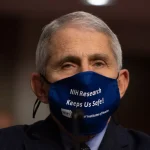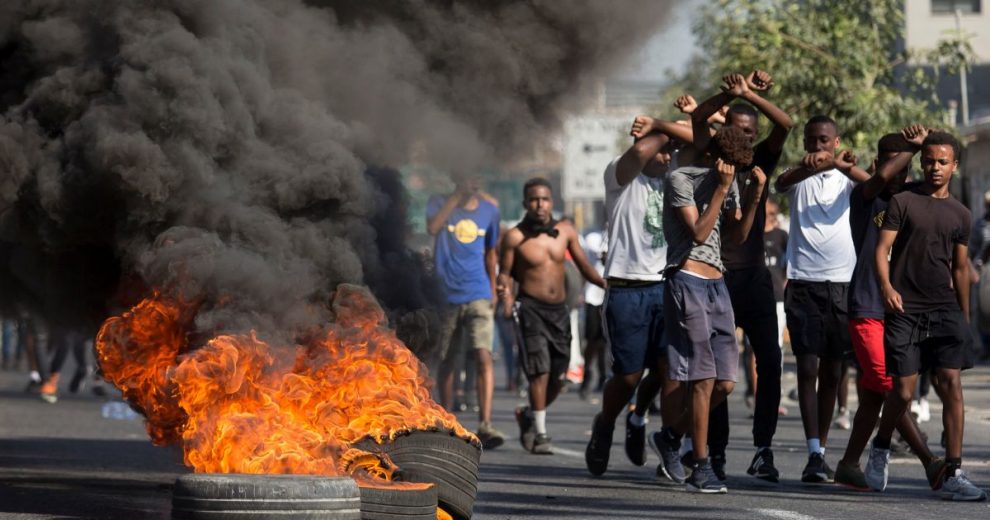Hundreds of Israelis took to the streets in the area of the northern city of Haifa on Monday to protest the shooting of 18-year-old Israeli teen of Ethiopian descent Solomon Teka, who was shot to death by an off-duty police officer the day before.
On Monday everning, law enforcement sources said an investigation into the incident strengthened the evaluation that the police officer, a 33-year-old from Haifa whose name remains under gag order, shot at the ground, and that bullet ricocheted, hitting Teka.
In the morning, masses protested outside the Kiryat Haim police station, and later marched to Kiryat Haim junction, shouting “A violent policeman needs to be [imprisoned],” and “Black, white, we’re all human.” At Kiryat Atta junction, demonstrators set tires ablaze and blocked the road. Police closed sections of road between the suburbs due to the protests.
Demonstrators lit memorial candles at the site of the shooting, and some marched toward the home of the police officer, a 33-year-old from Haifa, whose name remains under gag order.
The furious demonstrators refused to speak to journalists, who they slammed as belonging to the “White media.” A few claimed that reports on the shooting included distorted information. “You know our story. We don’t need to talk,” one protester told reporters.
Another protester used her body to block the entrance to the police station of Krayot, which serves three Haifa suburbs, shouting: “They sent a kid to jail here for a month and a half for kicking a cat. If he were white, would they have sent him to jail?”
Teka’s mother entered a meeting at the Kiryat Haim police station Monday afternoon, screaming: “Why didn’t they shoot him in the legs?” Teka’s grandfather told Haaretz that his grandson “was a good boy that wanted to draft to the army, and there was no need to shoot him.” He added that “the one who shot Salamon needs to receive the punishment he deserves.”
Protests continued into the evening, and demonstrators, some masked, lit trash cans on fire in Kiryat Ata junction in Haifa. In the southern city of Be’er Sheva, dozens of people joined protests at Bilu junction. In Netivot, also in the south, demonstrators burned tires in two protests.
A young woman from Kiryat Bialik who joined the protests said that she and her friends “came to scream the pain of Solomon Teka and all of our brothers, not to be silent.” She added, “We’re protesting against the police and against the country that hasn’t done anything, Elor Azaria was imprisoned for a few months for killing a terrorists, and the police officers who shot Salomon and Yosef Salamsa” – a 22-year-old Ethiopian Israeli who took his own life after being tasered by police – “walk free.”
Another protestor, a resident of Kiryat Ata, said that the police “are not keeping the law. They’re breaking the law.” He added, “It’s clear racism. Not a single one of us will vote in the coming elections. Why vote? None of them will help, as you can see.”
Interim police chief Maj. Gen. Moti Cohen said that the police needed to carry out “a thorough and comprehensive evaluation” of the circumstances of the incident. Cohen appealed to the Ethiopian community to “restrain their fervor and shut their emotions” in the wake of Sunday’s shooting.
Regarding the investigation into the shooter, who is suspected of murder, Cohen called for “restraint and responsibility, and to avoid impassioned discourse. We must allow the [police investigators] to exhaust the investigation to its end. We are in constant communication with [Ethiopian] community officials in these difficult times as well, and we will make every effort to continue our shared path.”
The Police Investigations Department arrested the policeman who killed Teka on Sunday night. He was brought before a Haifa Magistrate’s Court judge to extend his remand and was released to house arrest until July 15. Judge Maria Fikus Bogdanov put a gag order on all details related to the investigation for seven days. Attorney Yair Nadashi, who is representing the policeman, said Monday morning that he was released Sunday night to the hospital.
“I met with him around 3 [A.M.],” Nadashi said. “He claims that the shooting was done as an act of self-defense after he was brutally attacked with rocks.” The officer has been designated by the police as being at “the highest level of risk.” As a result, he will be placed under police protection in a hotel in central Israel and is later expected to be transferred to an apartment police guarded by the police. In addition, security systems will be installed in his home.
‘There is no safety for our children’
Sami Baruka, the manager of the Kiryat Haim youth center, participated in the protests Monday morning. He had known Teka since he was 11, calling him a respectful child and the “salt of the earth,” saying that Teka dreamed of a combat service in the Israeli army. “Minister Erdan needs to wake up,” he said, referring to Public Security Minister Gilad Erdan.
“This police officer needs to go to prison. How can it be that a policeman who took the life of a youth is still just a suspect?” Baruka asked. “How can it be that each time an Ethiopian kid is killed and murdered by police, they sit under house arrest? Maybe they need to take them off the force. That’s a prize, not a punishment. This is an entire ethnic group that’s bleeding.” He added, “Why can’t I walk around and feel safe? I educate the kid to give back [to the community,] and in the end they’re bringing him to his parents in a casket. The government needs to wake up.”
Michal Abara Samuel, the CEO of the Fidel Association for integrating Ethiopian Jews, said that sadly, the Ethiopian community’s youth is once again experiencing police violence. “The feeling is that there is no safety for our children.” She added that for parents of Ethiopian descent, “there is no certainty in raising your children in Israel with security and calm. I call on Prime Minister Benjamin Netanyahu and Minister Erdan to make this issue a priority and to deal with it urgently at its roots, to check the behavior of every police officer in the country.”
Israel Police said that the officer was not on duty at the time and was trying to separate two youths who were quarreling while he was at a playground with his wife and children. An eye witness claimed that the officer was the one who instigated the incident, threatening the youths with his weapon.
“After he identified himself as a police officer, the youths started throwing stones at him,” the police said. “The officer, who claims that he feared for his life, opened fire, and the circumstances are under investigation.”
Another eyewitness that was present at the scene of the shooting told Haaretz that “the police officer wasn’t in a life-threatening situation. He assumed a firing position and shot Salamon who was at least 30 meters away from him.”
Story cited here.
























